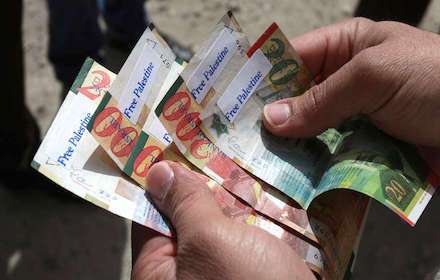www.aljazeerah.info
Opinion Editorials, June 2019
Archives
Mission & Name
Conflict Terminology
Editorials
Gaza Holocaust
Gulf War
Isdood
Islam
News
News Photos
Opinion Editorials
US Foreign Policy (Dr. El-Najjar's Articles)
www.aljazeerah.info
Follow the Shekels: Israel's Financial Manipulation of the Palestinian Economy By Eve Mykytyn Redress, June 24, 2019 |
 |
 |
|
Israel has a cash economy that is large for a developed nation – 22 per cent of its GDP is cash. The problem with so much cash, as the Israel Tax Authority explains, is that: “Due to the fact that cash is anonymous and it is not possible to identify its users, this makes it possible to easily carry out commercial and financial activity far from the eyes of the authorities.” In contrast, the US’s cash economy is 8.6 per cent and in the spirit of the “special” laws on “anti Semitism”, which require that Israel’s bad behaviour be compared to that of other countries, Greece is at 27.3 per cent.
This shadow economy has cost Israel an estimated $70 billion in lost tax revenues. After two years of debate, in March 2018 the Knesset passed legislation limiting cash transactions to amounts under about $3,000. The law became effective on 1 January 2019. This generous grace period presumably allowed those who wished to complete cash transactions to do so before the law became effective.
In addition, enforcement has been gradual. Fines are assessed only after a first violation until September 2019 and interest-free religious lenders are exempt for two years. Also exempt are immigrants or returning Israelis who have neither to report nor pay taxes on income earned abroad for their first 10 years in Israel.
A far more serious and likely intentional consequence of Israel’s new anti-cash law is that it has added to the already significant financial woes of the Palestinians in the West Bank and Gaza.
One consequence of the new law, in not permitting a buyer of real estate to pay in cash (he must also now declare his source of funds), was that the number of real estate transactions rose in December. This led some to opine that the market was heating up, but a drop in real estate transactions in January showed the rise was due to buyers avoiding the new law.
A far more serious and likely intentional consequence of Israel’s new anti-cash law is that it has added to the already significant financial woes of the Palestinians in the West Bank and Gaza. Although the West Bank and Gaza have an independent banking system that is supervised by the Palestine Monetary Authority (PMA), the Palestinian economy is dependent on Israel. The approximately 140,000 to 185,000 Palestinians who work in Israel often hold the kind of low paid service jobs that pay in cash, and they along with some Israeli Palestinians spend shekels in Palestinian areas. This is primarily how shekels enter the Palestinian market.
In 1994 Israel and the Palestine Liberation Organisation reached an agreement entitled the “Paris Protocol” which guaranteed that the shekel would be one of three official currencies in the Palestinian territories. It is, in fact, the primary currency for Palestinians. In return, Israel agreed to both accept surplus shekels from Palestinian banks and to convert shekels into foreign currency.
Israeli banks stopped processing funds from Gaza when Hamas was elected and the Israeli government declared the Gaza Strip a “hostile territory”. Beginning in 2016, Israeli banks began to sever ties with the West Bank as well. As PMA Governor Azzam al-Shawa explained, Israeli banks excused their own violations of the Paris Protocol by claiming that Palestinian banks were engaged in money laundering and terror financing. To learn about some recent money laundering activities of Israel’s banks, click here. One reason Israeli banks do not want to handle West Bank shekels is the cost of processing a large number of small value transactions.
True control lies in Israel’s central bank, the Bank of Israel, which sets and enforces caps on the value of shekels that Palestinian banks can transfer. Under its aegis there has been a steady increase in the cash in Palestinian vaults. According to the PMA, during the past year, the cash surplus in Palestinian banks has risen to about $1.12 billion.
As Palestinian economist Bishara Dabah points out, Israel’s new anti-cash law will have a most effect on Palestinians and Palestinian banks: the cash they can’t convert or transfer may now not be spent either. Dabah noted that the alternative of dollars was not available as “Banks in the West Bank are already out of dollars”.
Dabah explained that among the negative effects on the Palestinian economy was the high cost for banks to hold all this cash, thus reducing their ability to contribute to economic development.
How is it that it is a negative for a bank to have too much cash? One reason is the expense of physically securing the cash. More important, banks make money by earning interest, not by holding cash in a vault. Palestinian banks cannot make a return on cash if they cannot invest it, or even simply earn interest by depositing the cash in Israeli or other banks.
This also hurts Palestinian businesses that cannot deposit money (bear in mind, this is a cash economy) in their own banks because the banks do not want more cash. A Palestinian gas station owner quoted in the Media Line said: “My business is already suffering from the bad economy and the crisis that the PA [Palestinian Authority] is going through… I receive a lot of cash on a daily basis and I don’t know where to put it anymore, which is a huge issue.”
Israel gains even more control of the Palestinian economy by forcing Palestinians into a cash economy and then effectively managing the ability of Palestinian banks to utilise cash deposits, Israel can decide when and if Palestinian money can circulate as it must for the economy to function.
And what about the Israelis? Why do they keep Palestinian territories on a cash economy? The PMA has consistently endeavoured to force employers to use electronic deposits and payments. Of course, this can only be done with the active cooperation of the Israelis who have so far paid only lip service to such changes.
In making Palestinian banks dysfunctional, Israel reaps a number of benefits. Israel gains even more control of the Palestinian economy by forcing Palestinians into a cash economy and then effectively managing the ability of Palestinian banks to utilise cash deposits, Israel can decide when and if Palestinian money can circulate as it must for the economy to function.
Israel derives the added benefit of parking its cash in Palestinian banks. By controlling the amount of money held in suspension in Palestinian banks, Israel can manage the amount of money in circulation in Israel without having to either print shekels or buy them back.
A possible solution would be for Palestinian territories to drop or reduce the use of the shekel. Shawa has promised to explore that option and “[form] a team to study dropping the shekel, either by resorting to an encrypted currency, digital currency or other options”. The problem, of course, is that Palestinian lands are under Israeli domination, and workers are paid in shekels.
Even cheques and wire transfers from Palestinian banks must be approved by Israel. These responsibilities currently fall on two Israeli banks: Bank Hapoalim Ltd and Israel Discount Bank Ltd. These banks often fail to act, claiming that processing even mundane transactions from Palestinian banks might make them liable for aiding terrorism. To counter the banks’ supposed fear of prosecution for aiding terrorism, the PMA proposed that Israel form a state-owned Israeli entity in conjunction with the PMA to approve cheques and wire transfers from banks operating in Palestinian territory.
Israel’s cabinet approved a similar proposal and agreed to allow the Bank of Israel to form a distinct body to process ordinary Palestinian bank activity. Israel has yet to allocate a budget for this entity nor has it pursued the necessary technical nor legal input. Shawa sadly remarked on the arrangement: “If we one day have a two-state solution, [this] resemble[s] how the central banks interact with each other.”
***
Share the link of this article with your facebook friends
|
|
|
|
||
|
||||||


